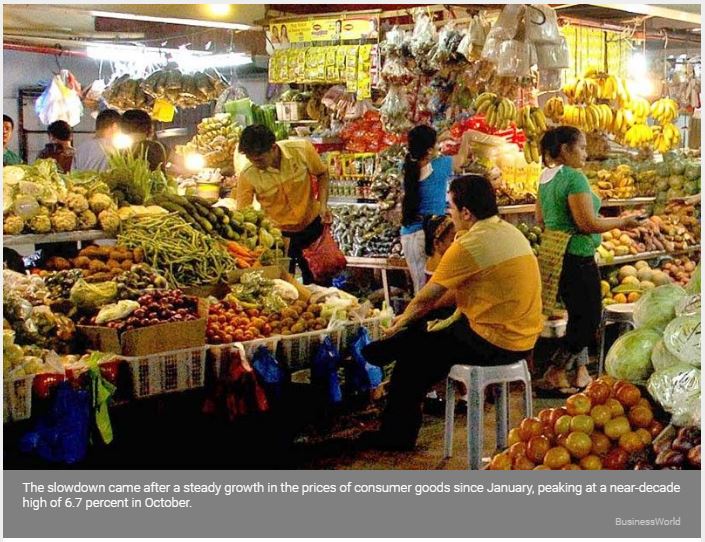Philippines: Inflation slows to 6% in November
But BSP keeps tight watch on core index
MANILA, Philippines — Reprieve from rising prices is on the horizon for consumers as headline inflation – or the rate of increase in prices – slowed down to six percent in November from 6.7 percent the previous month, the Philippine Statistics Authority (PSA) said yesterday.
The slowdown came after a steady growth in the prices of consumer goods since January, peaking at a near-decade high of 6.7 percent in October.
“This is really an indication of a decreasing trend in inflation,” national statistician Lisa Grace Bersales said at a briefing yesterday.
Slower annual increases were seen in the indices of food and non-alcoholic beverages; housing, water, electricity, gas and other fuels; and communication.
The annual gain in the heavily weighted food index eased to 7.7 percent in November from 9.2 percent in October and 3.1 percent in November 2017. Slower price increases were seen for rice, corn, meat, fish, fruits, vegetables, as well as sugar, jam, honey, chocolate and confectionery.
But core inflation, which excludes volatile food and energy items, continued to move upward, settling at 5.1 percent in November from 4.9 percent in October.
Among the 11 commodity groups surveyed, food and non-alcoholic beverages; housing, water gas, electricity and fuels; and transport emerged as the main commodity groups that fueled inflation in November.
Inflation in the National Capital Region (NCR) decelerated to 5.6 percent in November from 6.1 percent the previous month.
In areas outside NCR (AONCR), the rise in the prices of consumer goods likewise slowed down to 6.2 percent in November from 6.8 percent in October.
Among regions, the highest headline inflation was seen in the Bicol Region at 8.9 percent and the lowest in Central Luzon at 4.4 percent.
Economic managers cite effective gov’t action
In a joint statement, economic managers said the slowdown in inflation in November suggests the effectiveness of measures taken by the government to stabilize prices.
“It is comforting for us that the slowdown will alleviate the struggles of poor Filipinos, especially now that the holiday season is just around the corner. This makes us even more determined in curbing inflation and enforcing all measures to guarantee food security,” they said.
In September, President Duterte signed Administrative Order 13, removing non-tariff barriers in the importation of agricultural products to ease the importation of foodstuff in a bid to rapidly increase supply and drive down prices.
“This is a positive development in the government’s commitment to manage inflation. But mitigating measures under various government issuances, including those prescribed in Administrative Order 13, issued by the President should be continuously implemented and strictly monitored. Most importantly, we must ensure the timely arrival of rice imports to compensate for the lost palay harvest in the third quarter of the year,” the economic managers said.
The expected signing of the Rice Tariffication Bill into law soon and the full operationalization of the National Window System to allow seamless imports processing and to avoid unwarranted delays is also seen to contribute to the lowering of rice prices.
They also urged the Department of Agriculture (DA) to fasttrack the issuance of Fisheries Administrative Order 259 to allow the importation of frozen fish and fishery aquatic products for wet markets during closed and off-season or during the occurrence of calamities.
“We are optimistic that inflation will stabilize further in the near term. But we will keep a vigilant eye on upward pressures such as volatility in the global oil market,” the economic managers added.
They noted that more oil companies announcing a price rollback due to falling oil prices in the global market is also “welcome news.” The Land Transportation Franchising and Regulatory Board (LTFRB) has also ordered a provisional decrease in the minimum fare for Public Utility Jeepneys (PUJ) from P10 to P9 in the National Capital Region, Region III, and Region IV.
“Managing inflation expectations, however, is crucial. We ask the business sector to avoid any unwarranted price increases as experienced during the rollout of the first tranche of fuel excise tax increase,” said the economic managers.
“But we urge the public to be on the lookout and report any profiteering activities. We assure everyone that we will follow through with our efforts to maintain price stability and raise the quality of life of every Filipino,” they added.
BSP not letting guard down
The Bangko Sentral ng Pilipinas (BSP), however, is not letting its guard down even if inflation eased for the first time this year.
BSP Governor Nestor Espenilla Jr. said there is need to closely monitor rising core inflation that excludes the volatile oil and food prices.
“There’s need to pay close attention to the core inflation trend which continue to rise through November at 5.1 percent. Monetary policy will need to stay vigilant to keep inflation under firm control amid expected strong economic growth,” he added.
Core inflation is an indicator of the underlying movement in consumer prices since it takes out the effect of temporary disturbances and shocks that cause prices to surge or decline, independent or economic and monetary policy.
The volatility of inflation in the country has been caused by factors such as disturbances in agricultural food supply or movements in international oil prices.
Source: https://www.philstar.com/business/2018/12/06/1874479/inflation-slows-6-november#ux1QFpTCGGluUoQz.99


 Thailand
Thailand




